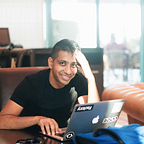Why Competition Is Not Inclusive and How Collaboration Improves It.
‘If you want to be good at swimming in pools, that is fine, go for Kaggle. If you want to be good on the open sea, go for Omdena’ — Leonardo Sanchez, Omdena challenge collaborator from Brazil.
‘What I learned in the past couple of months in Omdena’s AI challenge is much more than what I learned from all the competitions combined’ — Murli Sivashanmugam, Omdena Challenge collaborator from India.
Don’t get me wrong, I think Kaggle is a great platform for the data scientist to hone their skills and apply the lessons learned in theory.
But here is why it does not go far enough.
If you are a data scientist, to be on top in Kaggle you´ll struggle for 0.1% on the score. The amount of effort to do so is most of the times in real life not worthwhile. Adding data leaks´ exploration, stacking, boosting, ensemble to achieve 0.1% is a must-have. Of course, for a leaderboard, it is extremely valuable, but for real life, it is simply not worthy as it decreases interpretability.
Secondly, most of the solutions built are not replicable in production environments. Remember that in one you are seeking results on a leaderboard and in the other you are building entire solutions.
But more importantly, not everyone has access to fellow data scientists to work with and learn from. For example, people like Zaheeda, a single mother in South Africa or Munira, a Somalian refugee in Kenya, are located in remote parts of the world and may not have other people to collaborate with. Not everyone has access to a university or comes from bigger cities where they can meet other data scientists.
Organizations who want to put challenges on Kaggle have to make the dataset publicly, which does not fit all business models. In addition, many real-world problems require the company to closely work and iterate with the developers, which is not possible in Kaggle.
How to improve Kaggle and make it more inclusive
We thought it will be great to make people collaborate from all over the world by connecting them in a learning environment to work on an interesting real-world problem.
‘In the past, I have attempted a few competitions in ‘Kaggle’, even though it helped me improve my understanding on the AI domain, I felt the learning exposure is limited due to the context of competition. I believe the best learning happens when we work together as a team with a common goal’ — Murli Sivashanmugam, Omdena challenge collaborator from India.
The advantages for (aspiring) data scientists
- Getting your hands dirty through real-world experience. Rohith Paul from India says while “I participated in some Kaggle competition’s where the data was cleaned already, Omdena’s real-world exposure was a new experience for me and I loved it”.
- Work closely with domain experts. Most real-world problems are not limited to just a data science problem but involve domain experts to create value. We have seen that while working with domain experts, the data scientists from diverse backgrounds help the company to refine the problem and give a new perspective to the problem.
In the words of Aleksandr Laskorunskiy from Israel,
“Omdena can give such a big bonus for people through the opportunity to mention in their CV the real work experience, that is required by any company now”.
The advantages for organizations
- A selected group of 30–40 practitioners with different skills sets and experience levels.
- The data is shared internally.
- The community solving the problem includes the company (often data scientists) via direct exposure to the project and additional involvement if necessary.
- The community members are intrinsically motivated and have often faced the problem themselves. They not only build a model but also help the company refine the problem and put the problem into a bigger context. This is something we see over and over again in all challenges.
I totally agree with the emphasis on community and the right people with a purpose. That is actually the key to create a collaborative and knowledge-sharing environment and it is amazing to see how it works in action.
Daniel Mika, Fashion AI startup founder
And in the words of Saurav Suman from the UN World Food Program in Nepal,
The collaborative approach of Omdena is taking innovation to a whole new level with the idea of leveraging technology to bring in people with different capacities and work on a problem. The driving force behind this approach is the accelerated learning through collaborative spirit, mentoring and spot-on guidance.
In the past six months, our community has built deep learning models to detect trees and prevent forest fires with 99% accuracy, predictive models to identify safe areas and routes to stop sexual harassment, and models for tackling climate change and violent conflicts.
Many more use cases can be found on our blog.
